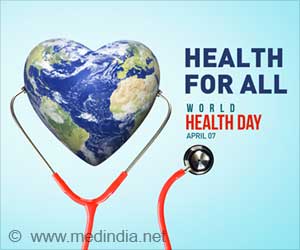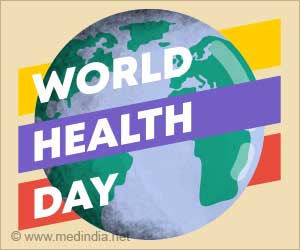World Health Day is an annual event on April 7th to raise awareness about global health issues and promote well-being worldwide.
- World Health Day celebrates the founding of the World Health Organization (WHO) and promotes health awareness globally
- The 2024 theme is "My Health, My Right," emphasizing universal healthcare access
- It highlights WHO’s achievements and encourages action towards better health for all
World Health Day
Go to source).
Sadly, half the world's population does not receive the essential health services they need. The rising healthcare costs have pushed more than 100 million people into poverty. #healthforall #worldhealthday #medindia’
What is World Health Organization (WHO)?
The World Health Organization (WHO) is a specialized agency of the United Nations (UN) that works towards advancing global health initiatives. Established in 1948, WHO has been at the forefront of addressing various health challenges worldwide, ranging from infectious diseases to non-communicable diseases, maternal and child health, mental health, and more.Through its strategic efforts, WHO has implemented numerous programs and initiatives aimed at improving health outcomes across different regions and populations. These initiatives include vaccination campaigns to eradicate diseases like Smallpox and Polio, promoting access to essential medicines and healthcare services, conducting research to better understand emerging health threats, and advocating for policies that prioritize public health.
Theme for World Health Day 2024
In 2024, marking WHO’s 76th anniversary, the theme for World Health Day 2024, "My Health, My Right," emphasizes universal access to quality healthcare, education, and information. It highlights the need for governments, healthcare organizations, and communities to prioritize health as a fundamental human right and invest in policies and programs that promote universal access to healthcare. This theme draws attention to the critical role of education in promoting health literacy and empowering individuals to take control of their health outcomes. It emphasizes the importance of empowering individuals to make informed decisions about their health and well-being, ensuring they have access to accurate and timely information to make educated choices.Furthermore, "My Health, My Right" underscores the importance of addressing disparities in healthcare access and outcomes, particularly among marginalized and vulnerable populations. It calls for action to eliminate barriers to healthcare access and promote health equity for all individuals. As the world works towards achieving the Sustainable Development Goals outlined by the United Nations, including Goal 3: Good Health and Well-being, the theme for World Health Day 2024 serves as a rallying cry for collective action to build resilient health systems and ensure that everyone has the opportunity to live a healthy and fulfilling life.
History of World Health Day
World Health Day has a rich history dating back to its inception on October 24, 1945, when the United Nations (UN) was established to enhance living standards worldwide, with a particular focus on public health. Just a few years later, on April 7, 1948, the constitution of the World Health Organization (WHO) was put into effect, marking a significant milestone in global health governance. This constitution brought together various pre-existing health organizations under one umbrella, laying the foundation for WHO’s vital work in addressing global health challenges.Although WHO officially began functioning in 1951, its impactful initiatives and efforts to tackle pressing health issues commenced immediately after its establishment. From combating infectious diseases to promoting maternal and child health, WHO has played a pivotal role in shaping the global health landscape and improving health outcomes for populations around the world. Through its comprehensive programs, research initiatives, and partnerships with governments and other stakeholders, WHO continues to lead the charge in advancing public health and achieving its mission of ensuring the highest attainable standard of health for all people.
Significance of World Health Day
World Health Day holds significant importance as it serves as a global platform to raise awareness among individuals, organizations, and governments about pressing health issues facing communities worldwide. By shining a spotlight on these challenges, World Health Day encourages dialogue, collaboration, and action to address health disparities and promote well-being for all.Moreover, the observance of World Health Day aligns with the United Nations’ sustainable development goals, which aim to achieve universal access to healthcare, reduce health inequalities, and ensure healthy lives for people of all ages. Through educational initiatives, advocacy campaigns, and community outreach efforts, World Health Day fosters a collective commitment to improving health outcomes and advancing global health equity.
It empowers individuals to take proactive steps towards enhancing their health and encourages policymakers to implement policies that prioritize public health and well-being. Ultimately, World Health Day catalyzes positive change, driving efforts to build healthier and more resilient societies worldwide.
Reference:
- World Health Day - (https://www.who.int/campaigns/world-health-day)
Source-Medindia













